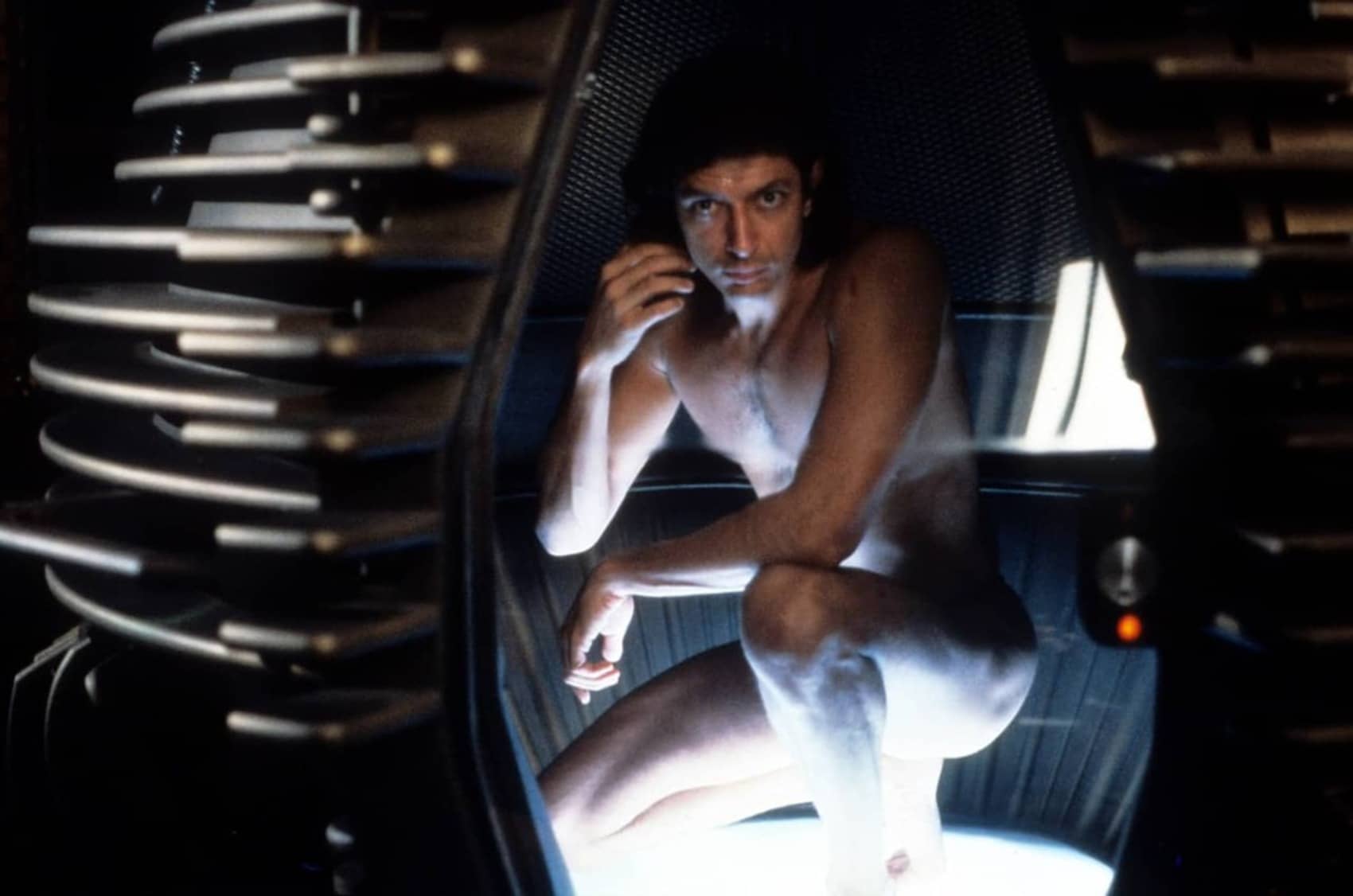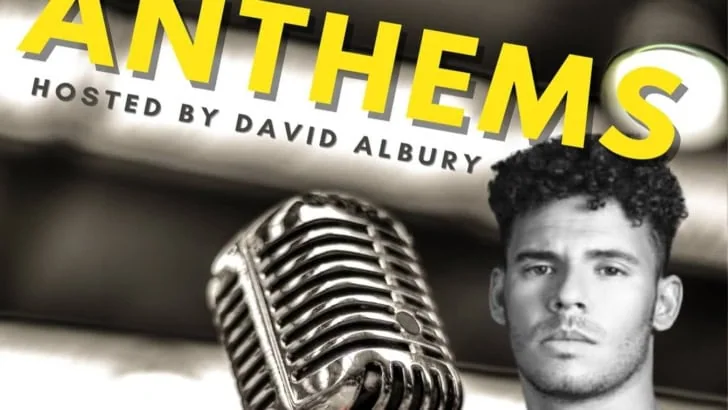Queer Horror Nights explores our Daddy Issues with a double dose of Cronenbergs at The Castle Cinema (24 June & 19 August)
For the next of our shows at The Castle Cinema, Queer Horror Nights presents DADDY ISSUES?, a trans-morphing double dose of sci-fi body horror from the biological father and son of the sub-genre: David Cronenberg’s THE FLY (1986) and Brandon Cronenberg’s POSSESSOR (2020).
What’s DADDY ISSUES about?
Well, it’s complicated…
We’re big fans of THE FLY but feel some safe queer space is required to talk more about the undercurrents in David Cronenberg’s body of body horror cinema. The arguments are likely divided between those that acclaim the director as a visionary of ‘the new flesh’ and those that see some troubling complexities in the way gender and sexuality have been addressed in his films.
Lianne McLarty in her article “Beyond the Veil of the Flesh”: Cronenberg and the Disembodiment of Horror published in The Dread of Difference, summarises how feminist critics have challenged Cronenberg’s early films (especially SHIVERS, RABID, and THE BROOD) for their undue focus on the “monstrous feminine”. In these films, “scientific experiments on women’s bodies result in consequences that have much more to do with the female body as a site of disgust than with the male science as a source of horror.”
Late gay critic – and committed Cronenberg antagonist – Robin Wood explained his concerns in Cronenberg: A Dissenting View, arguing that the director’s early films seem to regard (bi)sexuality as a threat to the world order. Whilst Wood is careful to caveat his concerns – “I am not in the least accusing SHIVERS of being anti gay or anti lesbian: it is anti everything” – he perceived a “regressive nihilism” in many of Cronenberg’s films as well as a lack of tragedy for “nothing of value is lost”.
These various issues appear to shift with THE FLY, the story of “a brilliant but eccentric scientist who begins to transform into a giant man/fly hybrid after one of his experiments goes horribly wrong” (IMDb). Cronenberg shifts his focus from portraying women as the site of horror to addressing the over-reaching mind of the ‘monstrous male scientist’. The scientist Seth Brundle (played by Jeff Goldblum) even goes so far as to admit his Frankenstein leanings as a modern male Prometheus: “I build bodies – I take them apart and put them back together again”.
There’s also a meaningful relationship at the heart of the film, reflected off-screen too as Goldblum was in an IRL squeeze with co-star Geena Davis at the time. Their relationship sits at the heart of THE FLY’s almost operatic tragedy, a sense underscored by Howard Shore’s excellent music and the stage-like warehouse apartment / laboratory set on which much of the action takes place.
One of the pivotal scenes of tragedy comes mid-point during Brundle’s transition into ‘Brundlefly’, the scientist regarding the progression of the mutation as a novel form of ‘cancer’ that will aggressively destroy his body. In 1986, some 5 years after the first cases of AIDS were reported, this scene had a particular resonance for anyone affected by the pandemic, but the director has made repeated disavowals of any such allegory in his film:
“If you, or your lover, has AIDS, you watch that film and of course you’ll see AIDS in it, but you don’t have to have that experience to respond emotionally to the movie and I think that’s really its power. This is not to say that AIDS didn’t have an incredible impact on everyone and, of course, after a certain point, people were seeing AIDS stories everywhere, so I don’t take any offence that people see that in my movie. For me though, there was something about THE FLY story that was much more universal: ageing and death – something all of us have to deal with.”
One of the key scenes of audience revulsion from THE FLY’s initial release – an awkward moment when Quaife (Davis) hugs Brundle just as his body falls apart – finds an echo in Princess Diana’s public hugs for patients on the AIDS wards of London’s Middlesex Hospital in 1987. For these reasons, The Advocate appropriates THE FLY in their list of 17 Horror Films Only LGBT People Understand, explaining “the sad tale of an ambitious outsider who died in his prime will have special meaning for many in the LGBT community, who watched their loved ones experience the same fate.”
As the UK waits for a release date for the director’s latest film, CRIMES OF THE FUTURE (2022), Cronenberg has made public statements about how this story too – about a celebrity performance artist who can manipulate his own body tissue – has (accidentally?) found contemporary queer relevance:
“Strangely and sadly it has huge political repercussions right now. When I wrote it 20 years ago I wasn’t thinking of that specifically but this is always a go around, of who controls the bodies of the citizens. Who controls women’s bodies? Who controls the bodies of transgender people?… Can the government actually tell you what to do with your body, or not, even if it doesn’t affect anyone else?”
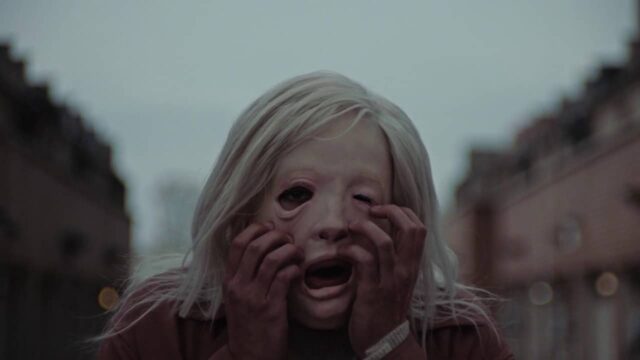
Whilst we wait, we can turn to David Cronenberg’s own progeny for an exploration of similar themes. His son, Brandon Cronenberg, has now made two feature films, ANTIVIRAL (2012) – a near future satire wherein a creepy clinic sells celebrity illnesses to obsessed fans – and the one we’re showing later in the summer at Queer Horror Nights, POSSESSOR.
Cronenberg Jnr. invested heavily in the family farm with this one. A gob-smacking slice of sci-fi mayhem, POSSESSOR is about a corporate assassin, Tasya Vos (Andrea Riseborough), whose consciousness can be transplanted into, and take control of, someone close to her next target. Inevitable glitches in the system result in catastrophic side-effects for both the parasite and her latest host, Colin Tate (Christopher Abbott).
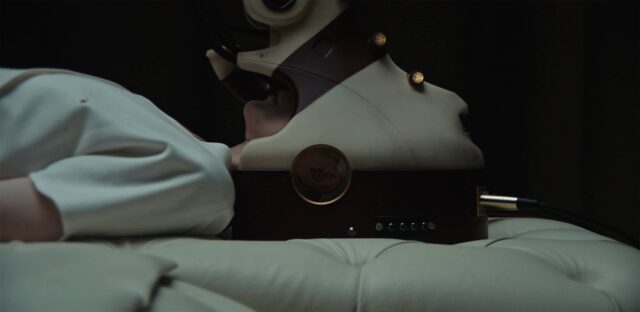
The meltdown between male host and female parasite results in hallucinatory gender-switching sequences where Abbott plays Riseborough/Vos inside Abbott/Tate. This is both achieved through old-fashioned body swap acting (think IT’S A BOY GIRL THING with considerable amounts of extra gore…) and the use of masks and more advanced makeup special FX. When the possessed Tate has sex with his female partner whilst possessed by Vos, the screen is awash with queer potential, including one shock moment that I won’t spoil (but, ‘adult content’ alert…).
It’s interesting to see what Cronenberg Jnr does with such material. Whilst it’s not clear what his attitude to queer/trans identities are, there is no doubt the extreme gender dysphoria encountered by the characters is intended to shock. There is a risk this draws again on the monstrous (trans) feminine. Quoting from Barbara Creed’s From Here to Modernity: Feminism and Postmodernism, McLarty again provides a context to such concerns: “Contemporary horror seems doubly dependent on images of the feminine for its postmodern paranoia: it simultaneously associates the monstrous with the feminine and communicates postmodern victimisation through images of feminisation”.
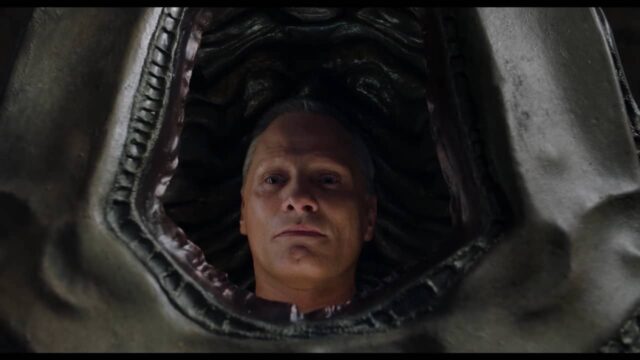
The room is divided. Nick Kassander in Possessor: A Trans Allegory perceives that both Vos and Tate are “transgender people”, seeing “an undoubtedly powerful connection” between the two characters that explains why they can’t rid themselves of each other. Conversely, The Forgetful Film Critic finds discomfort in these same sequences, feeling that the focus of the film is “the horror of a woman being inside of a man’s body”. Gretchen Filker-Martin, writing on Fanbyte, straddles both, arguing that “POSSESSOR never feels salacious or mean-spirited in its gender politics”, as these sequences function “first and foremost to further sever Vos from her sense of self”.
In this way, POSSESSOR becomes a battle for control, as the possessed host and the exploited parasite are exposed as victims of a socio-economic power structure that regards them both as inherently disposable. The last time POSSESSOR played in London was as part of the HUMAN RESOURCES series programmed by NFTS student Ryan Ninesling in 2021. Focusing on the film’s job title title, Ninesling cheekily pitched POSSESSOR as a “stylish and haunting critique of contemporary society’s increasingly shaky sense of what it means to have a work-life balance”.
From my perspective, using McLarty’s arguments from her analysis of Cronenberg Snr’s THE FLY, the horror in POSSESSOR is ultimately “directed more at the ‘patriarchal culprit’ and his phallocentric scientific practices than at the monstrous feminine.” That doesn’t stop there being problems along the way, and in films with no significant Black characters, it would be remiss of me to ignore the graphic death by police gunfire of Vos’ first victim of possession, young Black woman Holly (played by Gabrielle Graham), who gets violently dispatched in the film’s opening sequence.
Our other Queer Horror Nights this year are all directed by queer filmmakers, but we wanted to break that mould and explore two films with queer themes in DADDY ISSUES? Both THE FLY and POSSESSOR offer outstanding visions of horror. What better way to work through their complexities than by sitting in a dark room for some communal queer cinema therapy? I really hope you can join us.
TOKEN HOMO / June 2022
@lastframeclub & @tokenhomo continue their #QueerHorrorNights with DADDY ISSUES?, part of the SUMMER OF SCI-FI season (https://thecastlecinema.com/blog/post/summer-of-sci-fi/) at The Castle Cinema in Hackney (June to August).
THE FLY https://thecastlecinema.com screens on Friday 24 June at 7pm
POSSESSOR screens on Friday 19 August at 7pm.
